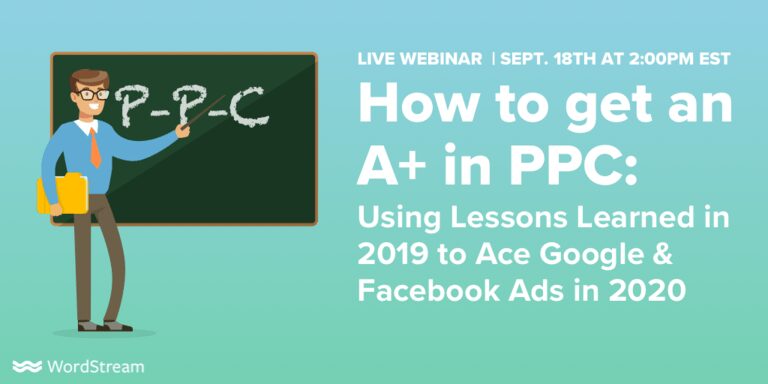For the first time since I was four years old, September doesn’t mean back-to-school season for yours truly. Gone (for now) are my days of pens, pencils, notebooks, and fluffernutters.
(Well, I guess there’s nothing really stopping me from continuing to eat fluffernutters for lunch—concerns about my “outward appearance” and “life expectancy” notwithstanding.)
But just because WordStream Customer Success Specialist Lauren Gentile and I are no longer students, doesn’t mean we don’t like to get a little scholarly every now and then. That’s why this month’s free WordStream webinar—live at 2 p.m. on Wednesday, September 18—is all about getting an A+ in PPC next year.

In line with the classroom theme, we’ll be dedicating the presentation to talking about the four biggest lessons we learned about Google Ads this year. Of course, we’ll turn each of those four lessons into actionable tips you can incorporate into your paid search strategy for 2020.
And because cross-platform strategies are the most effective strategies, Lauren will wrap up the presentation with the biggest lesson she learned about Facebook Ads this year. You’ll walk away with expert tips to help you with both search and social next year!
You’ll have to register for the webinar to get all of our insights. To get a sense of what you can expect, check out this sneak peek at two of the lessons we’ve learned this year!
1. Search isn’t a purely low-funnel channel
You’ve heard it before and you’ll hear it again: Facebook and the Google Display Network are for building brand awareness (targeting high-funnel prospects) and paid search is for driving conversions (targeting low-funnel prospects).
This has been the conventional wisdom for some time now, and for good reason: It’s true—to an extent. There’s no doubt that advertising on Facebook and across the GDN is a fantastic way to reach relevant users and generate interest in your business. Tangentially, there’s no doubt that paid search is an effective way to capitalize on that interest and win new customers.
And yet.
There’s an obvious fact that few people seem to acknowledge: People often search for products and services on Google well before they’re ready to buy them. In other words, prospects at the top of your marketing funnel are on the search network, too. Why wouldn’t you use that as an opportunity to make a good first impression?
Want to rise to the top of your class? Register now for more Google Ads lessons!
How to optimize your 2020 strategy
Set aside some budget for an awareness search campaign. Identify inexpensive high-funnel keywords (they exist) and attach them to ads that are appealing to users who want to learn rather than buy. You can use this example from Page Music Lessons as inspiration:

Is this user ready to fork over their credit card information? Nope. Yet here they are, using Google to learn more about their options should they choose to buy music lessons somewhere down the line. Wisely, the marketing team over at Page Music Lessons seizes this opportunity to make a good first impression and add a prospective customer to their remarketing pool.
2. Keywords are crucial, but they’re not everything
There’s another tenet of the PPC conventional wisdom we want to debunk: the notion that audience targeting is reserved exclusively for Facebook and the GDN. Nothing could be further from the truth!
Yes—keywords are still at the heart of your search campaigns. But, as we’ve covered time and time again on this blog, Google has been improving their suite of search network audience targeting solutions for years. Back in 2015, they introduced Customer Match to help you reconnect with past buyers. Less than a year later, demographic targeting came on the scene and allowed you to reach prospects based on characteristics like age and gender. And of course, 2017 and 2018 brought us similar audiences and in-market audiences, respectively.

Our point: Though keywords are a time-tested way to reach relevant users on the search network, failing to supplement them with audience targeting is a silly (and costly) mistake.
Ace Google & Facebook Ads in 2020—register now for more PPC lessons!
How to optimize your 2020 strategy
Layer audiences on top of keywords to reach your perfect prospects. If you sell something that mostly appeals to one group of people—such as retirement planning services, which are seldom sought out by people under 30—take advantage of demographic targeting. If you want to reach new people without assuming too much risk, give similar audiences a try. And if it’s crucial that you hit those low-funnel targets next quarter, in-market audiences are your best friend.
Don’t forget to register!
No matter how well your Google Ads campaigns have performed this year, there’s room for improvement in everyone’s account. As budgets increase and competition intensifies, it’s crucial that you put your best foot forward and think carefully about your 2020 search strategy.
Today’s sneak preview has barely scratched the surface of the insights Lauren and I will share during next week’s webinar. Register for free today and save your seat!
